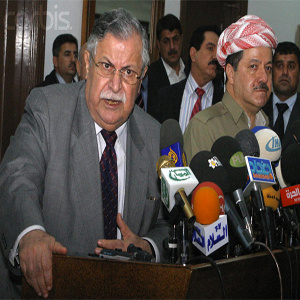The future of Iraqi Kurds’ leadership
The absence of Talabani leads to the general leadership of Barzani
A commentary by Morad Veisi

The Iraqi Kurds are discussing their probable leadership in post-Talabani era. In recent days, some sources claimed that Talabani is no longer the Secretary General of the Patriotic Union of Kurdistan (PUK). But the spokesman for the Patriotic Union of Kurdistan and Nazem Dabaq, the representative of the Union in Tehran, did not verify that.
Logically, it could not have been true, because Talabani is still popular and has great political authority. He is still the one who decides in the Patriotic Union of Kurdistan; and his intra-party critics are not that powerful to challenge his leadership. Talabani’s prudence and foresight in reaching a compromise among Iraqi groups for signing the security deal with the US have also increased the respect of Iraqi politicians towards him.
If we take a realistic look on his aging and the rumors of his illness, we would come to see the election of his successor as very important. Talabani is important for the Iraqi Kurds, because he can balance the Kurds’ weight in the future of Iraq. He also can stop the attempts to isolate the Kurds in decision making processes for the country. Talabani is important for the Kurdistan and the democrat party; because of the role he is playing in the leadership of Iraqi Kurds. The senior members of the Patriotic Union of Kurdistan would feel his absence as the absence of a charismatic leadership; and they know that finding a successor for him is much difficult. The Iraqi people would look at the absence of Talabani as the problem of finding a tactful leader like him as president. The countries having a stake in Iraq would also have to pay attention to the probable successor of Talabani, because it is very important in their future relationship with patriotic union, the Iraqi administration and the Kurds.
Right now, Talabani is one of the two leadership frontages of Iraqi Kurds. In the Kurds’ structure of leadership, Barzani expresses the pure, uncensored positions of the Kurds. But Talabani acts as the representative for Kurds’ participation in high administrative levels. The output of such leadership is Barzani’s frankness in expressing Kurds’ wishes; and the softer, peaceful approach of Talabani.
Without Talabani at power, finding a new leader for the patriotic union would be of a great importance.
Personally, Talabani has expressed his willingness in finding a modern leader with an experience in political arena of Iraq and enough credibility in international arena. Barham Salih, the deputy of patriotic union and the economic aide to the Iraqi prime minister is Talabani’s choice as a successor. During Saddam’s reign, he was abroad studying; and after Saddam’s fall, he occupied one of the key posts in the central government of Iraq.
But some groups which were inside Iraq during Saddam’s reign; and have suffered war and armed resistance, do not approve of Salih’s election. Kosrat Rasul and Noshirvan Mostafa are the two prominent figures representing these groups. Right now, Kosrat Rasul is the most important representative of the patriotic union in the coalition government with Barzani in Arbil; and he is Barezani’s deputy. But Noshirvan Mostafa has not been seen for years. There are rumors saying that he led an internal coup against Talabani in the political bureau of the union. This quasi coup started with a critical statement of some union members against Talabani; but Barzani’s support for his longtime rival stopped all these attempts.
Noshirvan Mostafa does not hold great authority in Kurdistan and Iraq, but he has certain influence on the groups within the party. If Talabani wants to choose his successor during his lifetime, he would probably choose Barham Salih. But if the leadership is going to be elected after his death, Salih would not probably make it.
In any case, and regardless of Talabani’s successor, one thing is certain: the position of the patriotic union would gradually become weak in contrast to the democrat party of Kurdistan. The personal charisma and the strong political background of Talabani have allowed him to underestimate the leadership of Molla Mostafa Barzani in the democrat party. After the Kurds’ defeat in the armed struggle of 1975, Talabani succeeded in hanging on to criticisms on Molla Mostafa’s leadership and establishing the patriotic union. He even promoted the union to the level of equal competition with the democrat party.
Despite his historical differences with Talabani and even the 5 years of internal wars among the Kurds, Masood Barzani did not succeed in underestimating Talabani’s leadership. At the outset of Saddam’s defeat, Barzani made an alliance with the patriotic union and Talabani; which is still going on. In the absence of Talabani, the patriotic union would probably be weakened and even absorbed in the democrat party. In such situation, Massod Barzani would have the chance for a general leadership of Iraqi Kurds.
Such changes in Iraqi Kurdistan would certainly make some changes in interactions of Iraq with countries like Iran. In the past three decades, Iran has had interactions with leadership of Talabani-Barzani; so Iran’s policies towards Northern Iraq should be reviewed in the near future.

